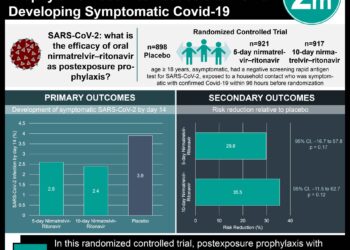Lopinavir-ritonavir does not improve clinical outcomes in patients hospitalized with COVID-19
1. Compared to standard therapy, patients in the lopinavir-ritonavir treatment group did not show reductions in 28-day mortality and progression to invasive mechanical ventilation or death.
2. There was no significant difference in length of hospital stay and proportion of patients discharged alive at 28 days for both groups.
Evidence Rating Level: 2 (Good)
Study Rundown: Previous studies on the use of lopinavir-ritonavir – an early contender for antiviral treatment for COVID-19 – has shown mixed results. This randomized, controlled, open-label trial aimed to assess whether or not lopinavir-ritonavir improves clinical outcomes in hospitalized patients with COVID-19. In comparison to standard therapy alone, patients allocated to the lopinavir-ritonavir (plus standard therapy) group showed no significant difference in 28-day mortality, time until discharge from hospital, proportion of patients discharged alive from hospital within 28 days, and risk of progression to invasive mechanical ventilation or death. Results were similar when comparing outcomes across six subgroups, defined by age, sex, ethnicity, respiratory support, days from symptom onset, and risk of 28-day mortality. This study was limited by a lack of evidence on the physiological, laboratory, and virological parameters of treatment, as well as inclusion of few intubated patients with COVID-19. Nevertheless, this study is the first large-scale randomized clinical trial to suggest that the use of lopinavir-ritonavir may not provide additional benefit to the current standard of care for hospitalized patients with COVID-19.
Click to read the study in The Lancet
Click to read an accompanying editorial in The Lancet
Relevant Reading: A Trial of Lopinavir-Ritonavir in Adults Hospitalized with Severe Covid-19
In-Depth [randomized controlled trial]: From March 19 to June 29, 2020, 5040 patients were randomly assigned to one of two treatment groups (2:1 randomization in favour of standard therapy) across 176 UK hospitals. The primary outcome was all-cause mortality at 28 days post-randomization, while secondary outcomes included time to discharge from the hospital and use of invasive mechanical ventilation or death. From March 19 to June 29, 2020, 5040 patients were randomly assigned to one of two treatment groups: standard therapy plus lopinavir-ritonavir (n=1616) and standard therapy alone (n=3424). Inclusion criteria for this study included having laboratory confirmed SARS-CoV-2 infection and no contraindications to participate, based on medical history. Patients with severe hepatic insufficiency were excluded. All patients were asked to complete a follow-up form at 28 days (4 weeks) after randomization or upon being discharged from the hospital, whichever came first.
The median age of patients in this study was 66.2 years (SD 15.9). 99% of patients (1606 of 1616 in the lopinavir-ritonavir group and 3412 of 3424 in the standard therapy group) completed follow-up at 28 days post-randomization. 87% of patients in the lopinavir-ritonavir group (n=1394) received at least one dose during the study period with median duration of treatment being 5 days (IQR 2-8). There was no significant difference in the proportion of patients who died within 28 days of treatment for both groups (374 patients in the lopinavir-ritonavir group [23%] vs. 767 patients in the standard therapy group [22%], IRR 1.03, 95% CI 0.91-1.17, p=0.60). The time until discharge from the hospital was also similar across both treatment groups (median 11 days, IQR 5-28), as was the probability of being discharged alive from the hospital at 28 days (IRR 0.98, 95% CI 0.91-1.05, p=0.53) and the use invasive mechanical ventilation or death (IRR 1.09, 95% CI 0.99-1.20, p=0.092). Furthermore, the number of patients requiring treatment within 28 days, among those not on renal dialysis or hemofiltration at the time of enrolment, was similar between both groups (66 of 1588 patients in the lopinavir-ritonavir group [4%] vs. 140 of 3348 patients in the usual care group [4%], IRR 0.99, 95% CI -.75-1.32, p=0.97). Overall, findings from this study illustrate that lopinavir-ritonavir does not provide additional treatment benefits for patients hospitalized with COVID-19.
Image: PD
©2020 2 Minute Medicine, Inc. All rights reserved. No works may be reproduced without expressed written consent from 2 Minute Medicine, Inc. Inquire about licensing here. No article should be construed as medical advice and is not intended as such by the







